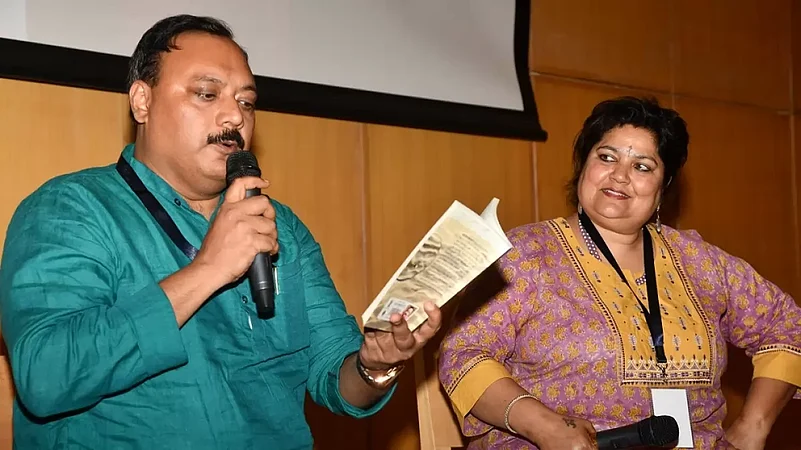Pravin Kumar steals a moment from his fans and friends to speak with Outlook about his latest book Amar Desva at Ahad Anhad, the Bihar Festival of Words and Performances. He sits down with feminist writer Geeta Shree who opens the discussion by saying, "Auratein hi kranti layengi (women will bring revolution),” as she adds to the discussion around citizenship and nationalism.
Attending the first Bihar Literature Festival is not all about celebrations and performances as Ahad Anhad defies the traditional temperaments of a literature festival. Here, authors, publishers, doctors and artists decide to keep truth, facts, debates, and contemporary socio-economic-political themes at the core of the festival.
After Amar Desva author Pravin Kumar and feminist writer Geeta Sree implore the themes of the book which deals with the Covid -19 pandemic, debates on citizenship and the state of emergency in India, audiences dwelled on the exciting yet turbulent discussion throughout the day. Prominent and modern writers from Bihar claimed their freedom of expression, minced no words, and presented their fearless thoughts on sensitive yet poignant issues that at present stand in front of us as a nation. Geeta Shree begins by talking about the act of identification of an individual and earmarking them with a number to acknowledge one as a citizen and how it is undignified as well as reductive to humanitarian values. Adding to this, Pravin says that the categorization of citizens into boxes and labelling them by the state machinery reflects how we have been reduced from humans to mere numbers in government documents.
Shree draws parallels between this change of identification imposed by the state and the shedding of a snake's skin – hinting at the disposability of how citizens are treated by governments and how the real human value to them has been disassociated. Later, while speaking with Outlook she also adds that she rejects the narrative of nation-building and citizenship as women by large remain migrants everywhere. "We have been subjected to exploitation and subjugation as second-grade citizens in the name of nature and whatnot by both, the society and governments," she says, therefore, explaining how the idea of citizenship is a patriarchal construct which has its root in discrimination.
In Amar Desva, Kumar accounts for the hundreds of thousands of unaccounted deaths during the pandemic in India. He makes it a point to ask his audience to ponder over who died the most during Covid and lockdowns, and what caste and class did the dead bodies belong to. In times of censorship and the dooming thread over freedom of writing and journalism, he makes a case about love and relationship in democracy. Inter-caste and inter-religious marriages being legal in India, inter-faith couples continue to live in constant terror. He asks, who are these couples really scared of? What makes them live a life in fear? Kumar's book, a work of fiction inspired by the realities of the Des (country), sketches a Muslim character who is forced by his circumstances to live under a Hindu name. The character falls in love with a Hindu woman and marries her. All this, while contemplating and fighting his reality. It is undoubtedly going to be a difficult task for the leaders of Amar Desva to humanise this character without stripping him of his own reality and experiences. It will be tempting for the reader to label him and earmark him with his religion. To dehumanise him and shove him in a box that the reader's perspective deems fine. It will be most convenient for the reader to erase his circumstances, and call his decisions, love, and marriage an act of "Love Jihad."
Unfailingly, Geeta Shree makes a note of this segment that is not an eluded truth. She recalls how Muslim women in Delhi and other Indian cities and towns must work under fabricated Hindu names to get or remain employed in Hindu households. The Islamophobia that the two authors highlight in this lesson for their audiences underlines the essence of the literature festival being held in the heart of Bihar.
WHERE THERE'S FEAR
In a state of emergency that poses hurdles to democratic values, freedom of expression and truth, Kumar says in a poetic fashion that one who dares to dissent against the Nizam is one who realises the fundamental values of India, a sovereign. While the audience doesn't miss the chance to clap at his bold statement, the dark reality that pulsates within the room as discomfort also rises amongst a section of the audience. Pravin adds to the discussion over the themes of his book by saying, "There's no democracy where there is fear." He mentions that his book is also an ode to young doctors who worked relentlessly and kept everything on the line to serve the people. Through three young doctors in Amar Desva, he brings to life the struggles of the frontline workers during the darkest of times.
When prodded by Geeta Shree over his reliance on news and media pieces in his book, Kumar refutes at the end by saying that real-life instances of underreporting of covid deaths by the media and distracting the citizens with news of lesser importance provoked him to document certain news articles and draw references from them. At last, he exposes the status of the fourth pillar of democracy in contemporary India by saying, "Newspapers helped the country realise independence. It is also the newspapers who are enslaving the nation now."


























